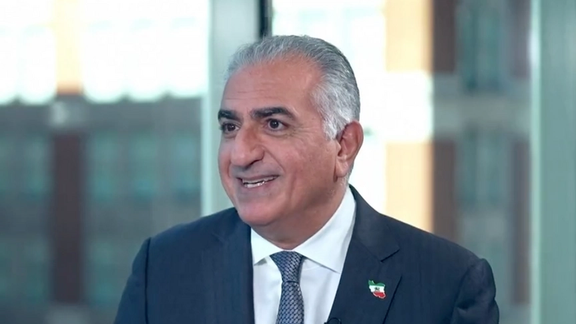Iran’s Exiled Prince Calls On Military To Protect People

Iran's exiled Prince Reza Pahlavi has called on Iran’s security forces to join the people and stand against the Islamic Republic’s repression machine.
In an exclusive interview with Iran International on Saturday Pahlavi said, "The army is the guardian of the country and the border, but today there is a situation where the internal enemy is shooting at the people... the military forces should be a shield for the defenseless people."
The exiled prince added that people will accept the security forces, noting that "People say that we do not intend to take revenge and we will accept you, but you should join us and not defend the system."
Iran's traditional army (Artesh) has been kept in a weak position by the Islamic Republic and is controlled by officiers from the revolutionary Guard (IRGC). Still, many hope that one day the army might come to the defense of protesters and stop the IRGC and other regime forces from using military and brutal force against the people.
Pahlavi also said that one of the measures needed to organize protests is to present a united front and select a leader for the opposition to interact with other countries.
The world must know what the alternative for the Islamic Republic is, he said, noting that political forces should cooperate beyond the streets.
"We may have different political inclinations in Iran tomorrow, but at this stage we have a common goal to save the country," he added.
Pahlavi held a meeting with a delegation from the European Parliament regarding the ongoing protests in Iran, urging European leaders to support the Iranians who are out on the streets for their demands.
In a tweet earlier in the day, he urged European countries to recall their ambassadors from Tehran.
Many demonstrators during a series of protests since 2017 have chanted slogans in support of the Pahlavi kings, seeing the 20th century dynasty as the force that modernized Iran, with building educational, industrial, military, legal and other infrastructure needed for development. However, Reza Pahlavi has said he is not aspiring to restore monarchy and the people should decide what form of government they prefer once the Islamic Republic is overthrown.
At the same time, voices among Iranians say that the current protests need a leadership and an alternative government to the clerical regime.
The latest round of nationwide protests in Iran appears to be different from the protests that have rocked the Islamic Republic since 2017.
The protests that started in Tehran on September 16 followed the death in custody of Mahsa Amini, 22, and not triggered by financial hardships Iranians have been experiencing in recent years.
The aim of most protesters, however, appears to be regime change and full freedom, not just partial concessions by the government.